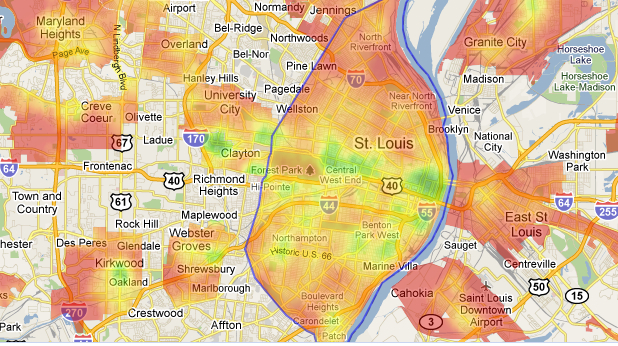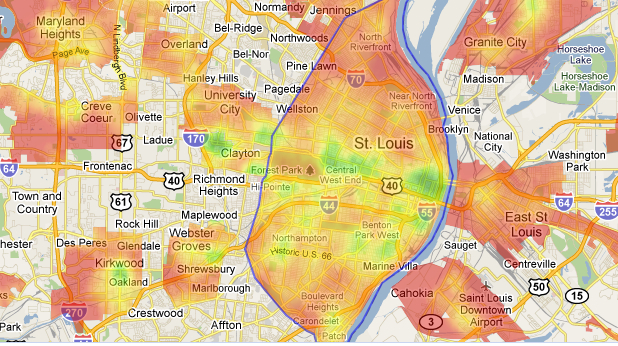Today, Walk Score rolled out new heat maps for the 2,500 largest American cities, providing a quick way to get a sense of where cities are most walkable. That could be useful if, say, you’re visiting an unfamiliar city on holiday travel and want to burn off some extra stuffing. Or if you’re thinking about moving.
Many of the maps, like St. Louis’s, are marked by isolated pockets of bright green walkability surrounded by seas of red auto-dependence. Others, like San Francisco, are veritable fields of green. They make nice illustrations of Alex Steffen’s concept of “deep walkability” — “deeply” walkable places give walkers and cyclists more freedom than just sticking to tiny neighborhood centers.
The heat-map feature builds on Walk Score’s namesake 1-100 walkability scoring tool (integrated into lots of real estate sites), its similar Transit Score, and several other innovative web tools from the Seattle software firm Front Seat.
Those offerings are helpful for giving people an intuitive way to understand walkability and transit connectedness — and for putting these concepts in the cultural lexicon.
They’re also limited in their accuracy, since they run off Google Maps data that doesn’t measure how busy a road is, whether it has sidewalks or crosswalks, or how desirable nearby amenities might be (a strip club helps a neighborhood’s rating as much as a grocery store does).
Professional doomsayer James Howard Kunstler made these shortcomings painfully obvious in his photo essay “The Horror of Downtown Atlanta.” Walk Score gives the city’s downtown Hilton an 86, a “Walker’s Paradise” score, yet the blank concrete facades and forbidding alleyways that Kunstler finds show that the presence of commercial activity does not always create a place normal people want to walk.
The Walk Score team has been forthright about the tool’s limitations — “If you live across the lake from a destination, we are assuming you will swim.” It’s working on improving some of those flaws in an upcoming release, although it hasn’t announced a date. Even with a brilliant, much-needed idea, it’s the execution that counts. And the execution here is still coming along.




